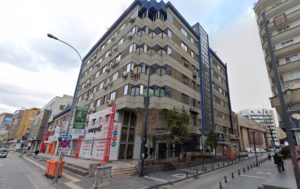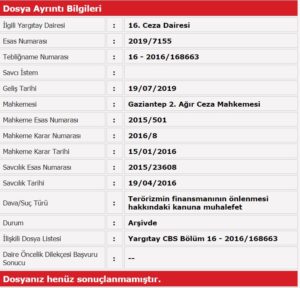Abdullah Bozkurt/Stockholm
For five years, Turkey’s top appeals court, staffed with Islamists and neo-nationalists, has not reviewed a scandalous ruling to acquit made by a lower court on the allegedly Islamic State in Iraq and Syria (ISIS)-run sex slave trade of Yazidis in a Turkish border province.
The case originated in 2015 in the province of Gaziantep where ISIS and jihadist cells have been active for years and allowed to operate with little in the way of restrictions by Turkish authorities. When an unregistered currency exchange house was reported in the news as having received cash in exchange for selling Yazidi woman and children to an intermediary, the police in the province had to act.
The police investigation confirmed the substance of the story when six individuals, all Syrians and one dual Turkish-Syrian national, were arrested and indicted on multiple charges. However, the case was quickly wrapped up, with all suspects acquitted and released. The ruling was appealed to the Supreme Court of Appeals in 2016 under pressure from the local bar association, but the higher court has never reviewed the case.
The indictment in an ISIS slave trade case involving a money exchange house was prepared in haste and ignored many key findings:
Nordic Monitor’s investigation of the case file shows a series of lapses in the investigation and trial of the suspects and that both the prosecutor and the panel of judges had rushed the proceedings, suggesting that Turkish authorities wanted to hush up the case and contain the damage from news coverage.
The faltering case reflected the general view of mistrust and bias harbored by the Turkish government when it comes to protecting the rights of Yazidis. The government’s views were clearly expressed by President Recep Tayyip Erdoğan on October 16, 2016 during an address to thousands of die-hard supporters in his hometown of Rize on the eastern Black Sea coast. He accused Yazidis of conspiring with Turkey’s terrorist enemies and involvement in wrong moves against his country.
Six people — identified as accountant Manhal Dabbas (34) and his father, Mohamed Dabagh (59), translator Omer Dabagh (29), Yahya Faham (41), employee Hecham Hadad (53) and Yusuf Kürdi (52) — were detained in the raid of the unregistered exchange office, located on a busy commercial street.

The office, operating under the name of the al-Amir Company, was only three blocks from the main provincial police station, which indicates that the authorities likely knew about the ISIS money exchange operations long before they were exposed in the media.
The media coverage prompted the Gaziantep Bar Association and the Progressive Women’s Association to file a criminal complaint with the public prosecutor’s office, asking authorities to investigate the claims. The police had to act under pressure and the prosecutor decided to file a rushed indictment without fully investigating the network’s reach and other suspects who were involved in the sex slave trade.
During the raid police found passports, cash in the amount of $371,711, 3,345 Turkish lira, 795 euros and 5,650 Syrian pounds, one money counting machine and receipts for money transfers in Arabic. The suspects claimed the money was for legitimate commerce between Turkey and Syria, although no evidence such as bills of lading, tax filings or sales receipts was collected to support this argument. The receipts showed that money was transferred to associates in Manbij in Syria when the area was still under ISIS control.
On December 23, 2015 the suspects were charged and indicted on charges of membership in a terrorist group and violating laws against the financing of terrorism, which require up to 10 years in prison for each violation in the event of conviction. The indictment drafted by prosecutor Ferhat Celaloğlu was submitted to the Gaziantep 2nd High Criminal Court.
Parliamentary question listed fallacies in the ISIS sex slave trade case and suggested a hurried hush-up:
At record speed, the trial date was set for a week from then and the first hearing in the case was held on December 31, 2015 with presiding judge Lutfi Türk overseeing the proceedings. The suspects pleaded not guilty to the charges and claimed they were conducting a legitimate cross-border trade. Hadad testified that al-Amir is based in Aleppo and that the office in Gaziantep was only a branch for the Syrian parent company. He claimed a partner in the firm could not enter Turkey and that that prevented the firm from officially filing the paperwork to register properly in Turkey.
In the second and final hearing on January 15, 2016 prosecutor Ömer Tuncay İpek delivered his shocking concluding remarks and requested the acquittal of all suspects. He said the prosecutor’s office agreed with the defense that there was no evidence to support the accusations. The court went along with the prosecutor’s request, acquitted all suspects and returned the confiscated cash.
The members of the judiciary involved in hushing up the scandalous case were rewarded by the government. Investigating prosecutor Celaloğlu, who ignored the evidence and decided to not expand the probe, was appointed to the Ankara Chief Public Prosecutor’s Office and assigned to oversee the financial crimes and smuggling unit. He made headlines in Turkey when he posted a message on Twitter announcing that he was with Erdoğan to the death. Judge Türk was promoted to be a senior judge in the Kayseri regional appeals court. Proseutor İpek was appointed to Erzurum province.
Turkey’s justice minister claimed no knowledge of the court case and said courts are independent from the executive branch:
The case left many questions unanswered. For one, the court did not even bother notifying the original plaintiffs in the case, an NGO and a bar association. It did not wait for the Turkish translation of the seized 1,768 receipts in Arabic so that they could be properly examined. The official translation of the receipts arrived at the court on January 25, 10 days after the court acquitted the suspects.
Although one of the suspects said the cash initially arrived at an exchange house in Istanbul and from there was distributed to offices in Gaziantep, the prosecutor did not look into the exchange house in Istanbul and did not pursue leads in Gaziantep, which was apparently home to more illegal cash transaction and money exchange houses.
The Treasury, which is required by law to be notified of any cash seized in a police raid, was not informed by the prosecutor or the court. The court did not file a complaint against the currency exchange house, which was found to be operating illegally. Neither the prosecutors nor the judges sought to identify the senders and recipients of the large amounts of money exchanged or for what purpose. For example, one seized receipt showed a one-time illegal money transfer in the amount of $500,000 between Turkey and Syria.
Opposition lawmaker Mahmut Toğrul from Gaziantep province filed a motion in parliament on May 13, 2016 asking Justice Minister Bekir Bozdağ for an explanation of all these bizarre happenings in the case. By law, the government should have provided a response to the eight questions asked by the opposition. Yet the justice minister took his time and responded on September 6, 2016. Citing judicial independence, Justice Minister Bozdağ did not answer any of the eight questions posed by Toğrul about the case of Yazidi women and children sold via a Turkish province. Adding insult to injury, Bozdağ said the Justice Ministry had no knowledge of the case at all and did not know what had happened with it.

The case was appealed with the Supreme Court of Appeals on April 19, 2016. However, the appeals court has never taken up the case for review.












